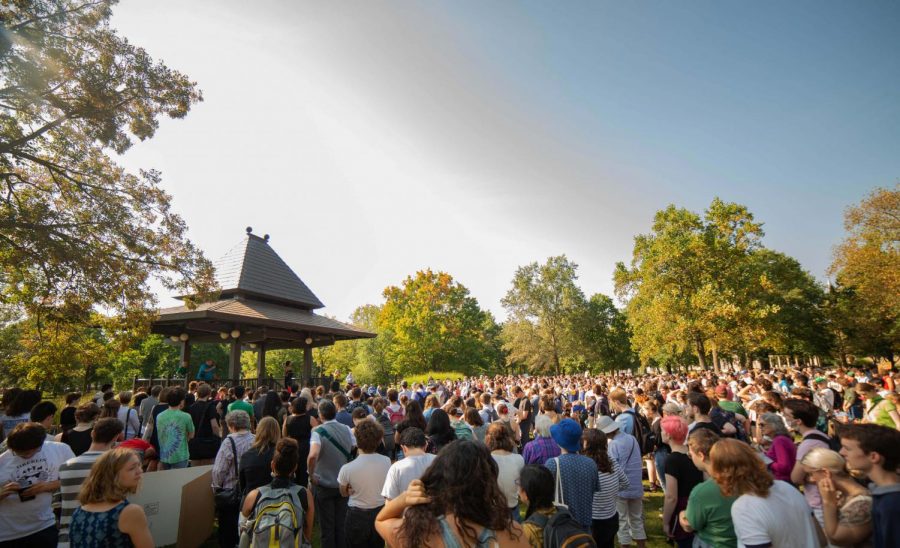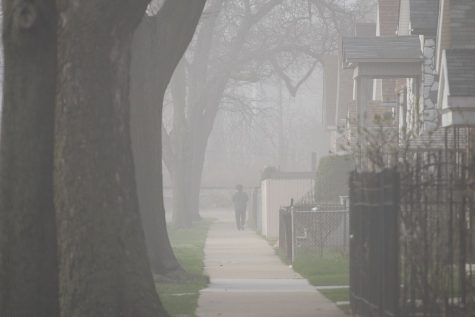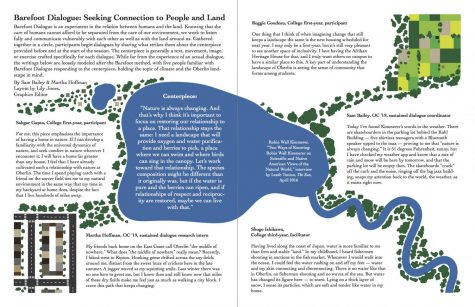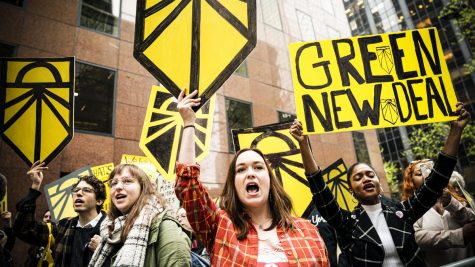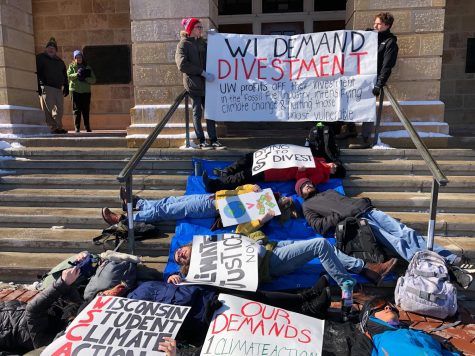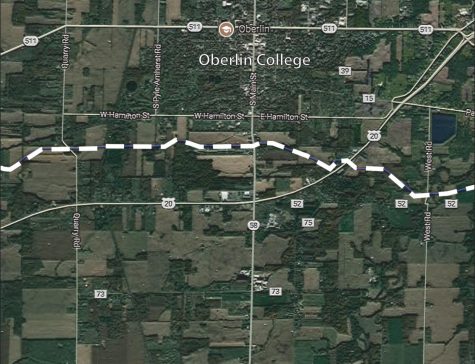A Dispatch From Oberlin’s Climate Strike
Students and community members gather in Tappan Square for a climate strike on the morning of Sept. 20.
Editor’s note: On Sept. 20, 2019, the Global Climate Strike took place in thousands of communities around the world, as millions of people rallied to support the urgency of climate change solutions. In Oberlin, more than 600 students and community members gathered at the grandstand in Tappan Square to join the global movement. The following was the rally’s opening address, which has been edited for length and clarity.
Good morning, everyone. My name is Faith Ward, and I want to welcome you to Oberlin’s Climate Strike, hosted by Sunrise Oberlin. Thank you so much for joining us.
We’re here today to address the climate crisis by examining both its symptoms and its causes. In these discussions, we tend to identify contributing factors like racism, corporate greed, and the patriarchy, but we often fail to investigate the role that colonialism has played, both in the roots of the climate crisis and the roots of its solutions. As such, it is absolutely necessary for us to acknowledge the role that we play in colonialism, as well as the role that it plays in our actions. We are on stolen land. It is precisely because of colonialism and violence committed against Indigenous peoples that this event is even taking place here today. We must acknowledge that we are on the traditional territory of the Erie people. We must recognize and appreciate their historic connection to this place. We must acknowledge the contributions that they and other Indigenous peoples have made in shaping and strengthening this community and our country as a whole.
However, we, as settlers, must go beyond simple recognition. We must be committed to listening, learning, and acting in order to bring justice to Indigenous communities — both in our fight against climate change and in our everyday lives. This applies, in particular, to the fight for justice for the missing and murdered Indigenous women and girls across our continent. We must continue forward with them in mind.
So why are we here today? In recent years, it has become increasingly clear that climate change poses an existential threat to our entire planet. A 2018 special report by the U.N.’s Intergovernmental Panel on Climate Change stated that we are rapidly approaching a point of no return. And in order to avoid it, the world needs to cut carbon emissions to half of 2010’s levels by 2030 and achieve net-zero emissions by 2050. If we fail, we are going to experience more heat waves, rising sea levels, increasingly powerful storms, and droughts — among a myriad of other destabilizing effects. As a result, humanity will be faced with the displacement and deaths of billions of people.
We are in a climate crisis.
As we wait for climate catastrophe to strike on a global scale, its early effects and the anxiety they bring already pervade our daily lives. For me, this threat is deeply personal. As a South Florida local whose house sits at an altitude of four feet, rising sea levels mean the threat of displacement for my family and everyone I grew up with.
For many, these threats don’t just exist in the future. Already, we see the insidious creep of climate gentrification in inland, historically Black and Brown neighborhoods — like Little Haiti in Miami — where developers seek land beyond the reach of ever-rising tides. At the same time, changing atmospheric conditions have already yielded hurricanes of increasing strength that threaten both my home and those of our neighbors in the Caribbean. We already see these effects in places such as Puerto Rico and the Bahamas, which have been left reeling from devastating hurricanes.
However, as we practice compassion for our planet and each other, we have to look beyond our immediate vicinity. For me, again, this gets personal. A few years ago, the news was filled with headlines about a severe drought and water crisis in Cape Town, South Africa. For most of my friends, they were just headlines. But for me, each one was a siren going off in my head. My dad was born and raised in Cape Town, and all I could think about was my family overseas. Having been forced from their land for race-mixing generations back — having suffered from systemic racism, poverty, and intergenerational trauma — my family would have to suffer even more. Each headline I read evoked a very specific type of pain, one from feeling so close to a problem but so desperately far away at the same time. And I felt that pain knowing that, as climate change progresses, such water crises will only get worse and devastate more communities.
Far too many of us have stories like these as we continue to watch deadly natural disasters and man-made environmental degradation wreak havoc on a global scale.
We have been demanding action from our governments for years, but it seems as if they don’t care. Even here in Ohio, we have a state legislature currently passing bills like House Bill 6, which provides bailouts to nuclear and coal plants while gutting green energy standards and subsidies. They continue to fill their vaults with corporate money while ignoring the negative impacts their actions have on human health.
This is why we strike. We know that these policies endanger human lives, but fossil fuel companies and the politicians in their pockets don’t care. Dangerous levels of carbon emissions mean that business is doing exactly what it’s supposed to do. When the obstacle before us is one of this scale, with as much money as these companies have, individual action is not enough. Ditching plastic straws won’t change the fact that just 100 companies are responsible for over 70 percent of carbon emissions since 1988, or that the U.S. military alone is a bigger polluter than most mid-sized countries. We need collective action.
That is why we strike.
We stand in solidarity with frontline communities all over the world who are already facing the consequences of decades of apathy, who are already paying for the failures of our legislators with their bodies and minds, who have no choice but to wear masks to protect themselves from the unlivable conditions that have been imposed upon them. We stand with them, with our friends and families, with everyone who is already suffering and is going to suffer from the climate crisis.
We stand with them to demand action. For too long, our government has ignored this existential threat. For too long, they have put profit over people and numbered our days.
That is why today, people all over the world are hosting over 4,600 climate strike events across 139 countries to demand that international governments take action. In three days, the U.N. will be hosting an emergency climate action summit in New York City to discuss solutions to this crisis. We’re here today, striking in solidarity with millions of people across the globe, to show the U.N., the federal government, Ohio’s government, and even Lorain County, that we mean business.
We demand the protection of Indigenous sovereignty. We demand environmental justice for marginalized communities. We demand the protection of biodiversity. We demand sustainable agriculture, and we demand a Green New Deal. We are making these demands today, alongside millions of people, because we know that we have to act not just for ourselves, but for everyone on the frontlines. No one can be left behind as we fight for a better future. We’re here today out of desperation, out of pain, but also out of compassion for each other and our planet. We can’t afford to forget that.
Growing up, my mom always told me a story about my abuelo, my grandfather, a man who cared for the land he lived on more than anyone I’ve ever known. She told me that one night at dinner when she was young, before they ate, she watched my abuelo take a pinch of sugar and sprinkle it at the base of the dining room table. She warned him that it would attract ants and asked him why he was doing it. He responded, “Diay, mijita, ellas estaban aquí primero.” “They were here first.”
As we continue forward together — full of fear and anger, seeking change — I can only hope that we do so with the sort of compassion that’s bountiful enough for even the ants. Thank you.


